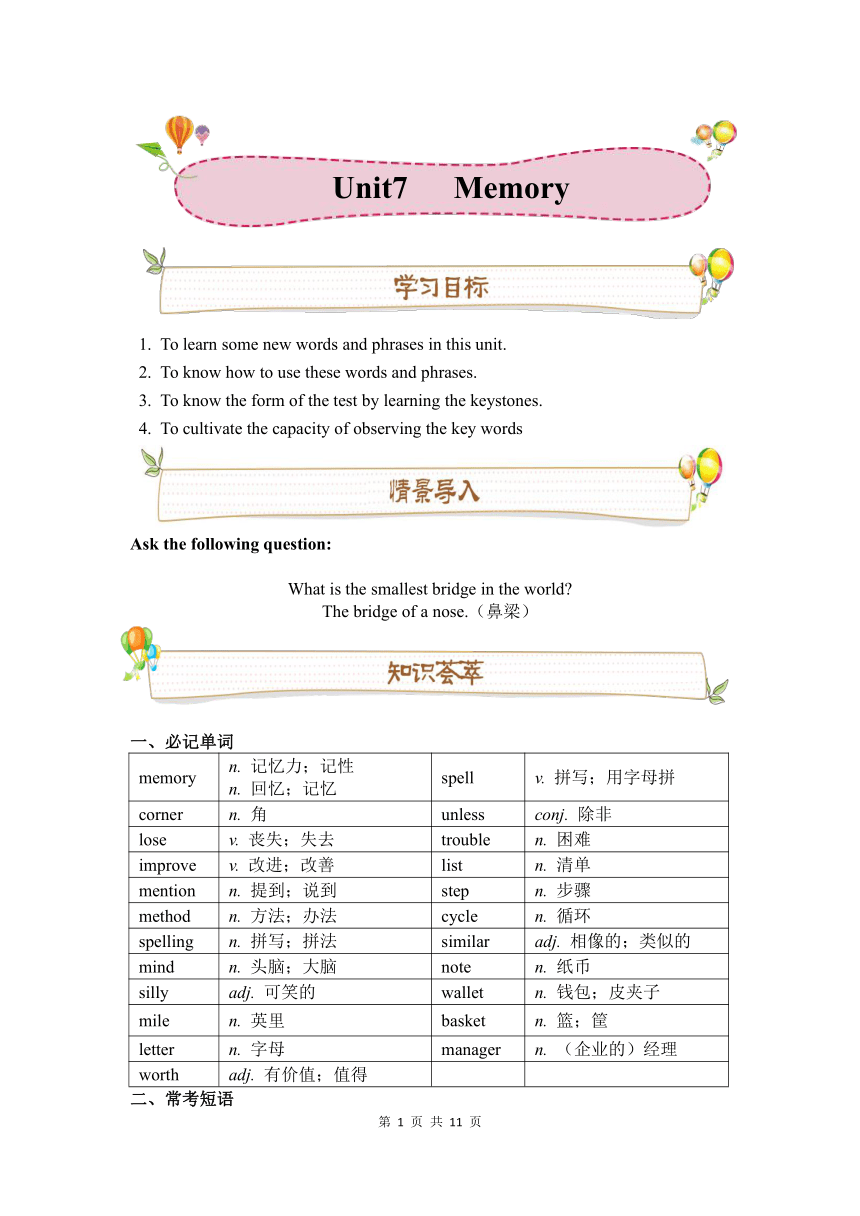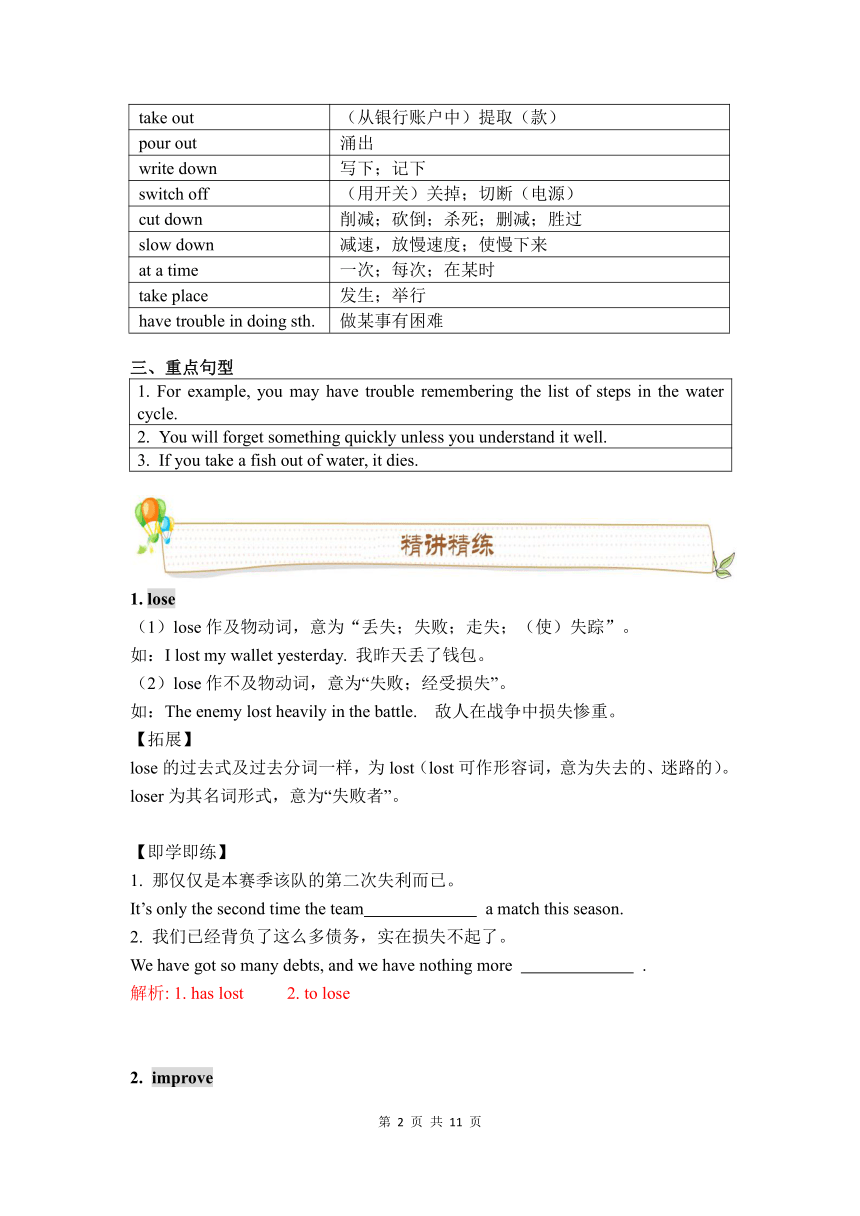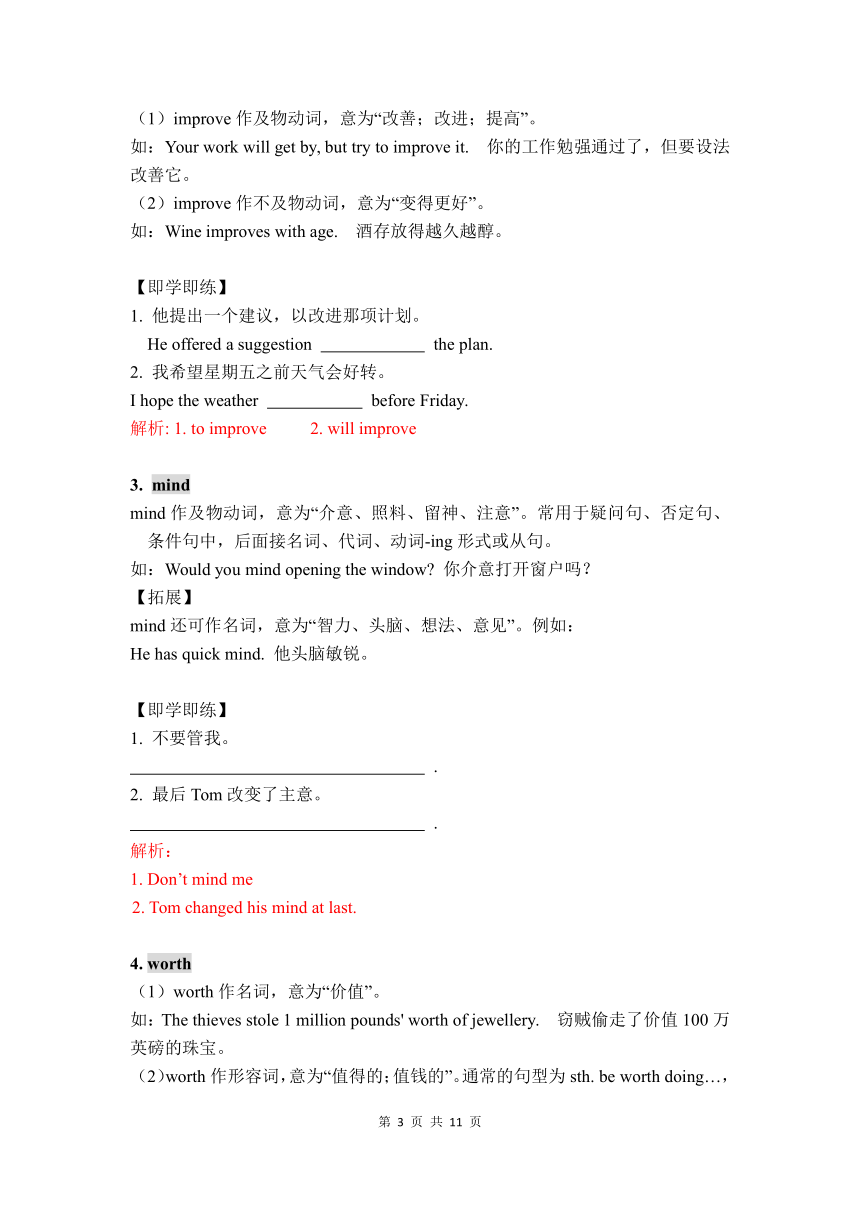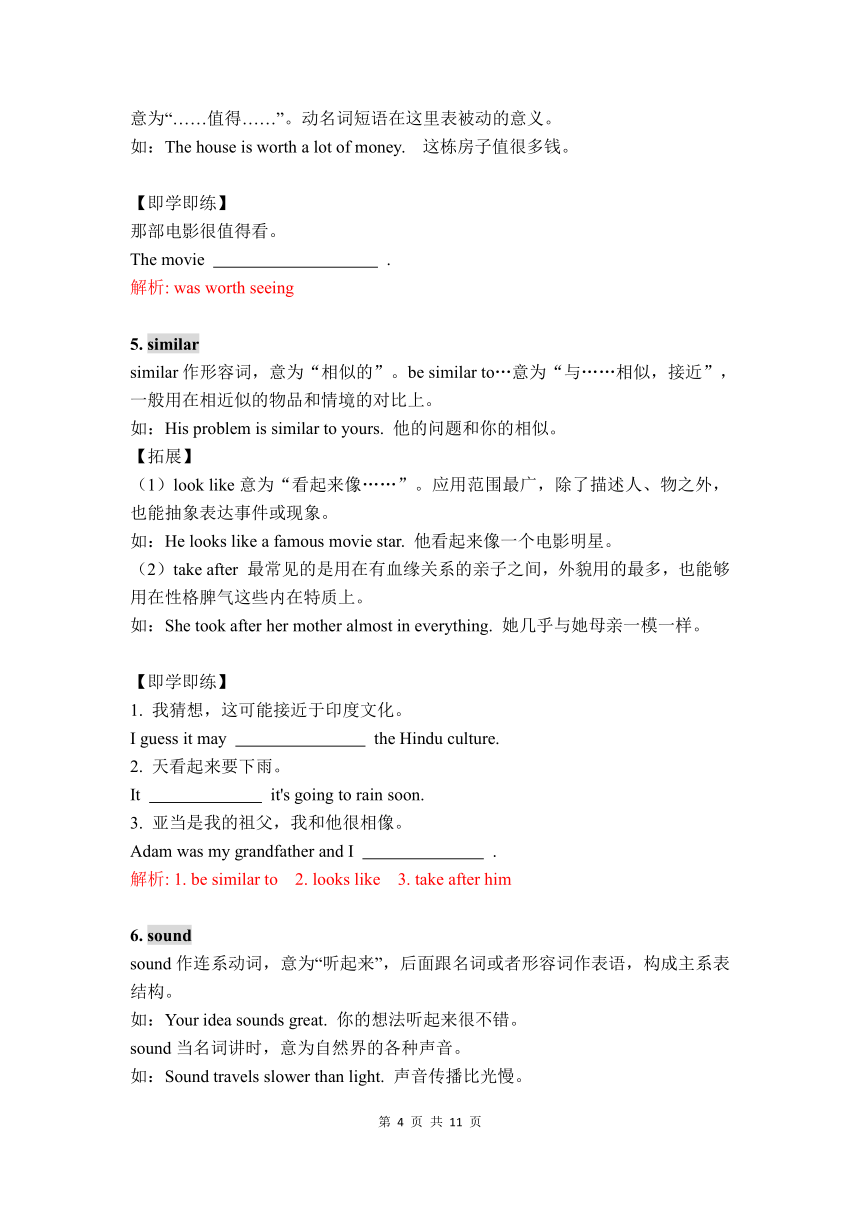Unit7 Memory 词汇讲义 (含答案)
文档属性
| 名称 | Unit7 Memory 词汇讲义 (含答案) |  | |
| 格式 | docx | ||
| 文件大小 | 418.8KB | ||
| 资源类型 | 教案 | ||
| 版本资源 | 牛津深圳版 | ||
| 科目 | 英语 | ||
| 更新时间 | 2021-07-23 13:00:03 | ||
图片预览





文档简介
To
learn
some
new
words
and
phrases
in
this
unit.
To
know
how
to
use
these
words
and
phrases.
To
know
the
form
of
the
test
by
learning
the
keystones.
To
cultivate
the
capacity
of
observing
the
key
words
Ask
the
following
question:
What
is
the
smallest
bridge
in
the
world?
The
bridge
of
a
nose.(鼻梁)
一、必记单词
memory
n.
记忆力;记性
n.
回忆;记忆
spell
v.
拼写;用字母拼
corner
n.
角
unless
conj.
除非
lose
v.
丧失;失去
trouble
n.
困难
improve
v.
改进;改善
list
n.
清单
mention
n.
提到;说到
step
n.
步骤
method
n.
方法;办法
cycle
n.
循环
spelling
n.
拼写;拼法
similar
adj.
相像的;类似的
mind
n.
头脑;大脑
note
n.
纸币
silly
adj.
可笑的
wallet
n.
钱包;皮夹子
mile
n.
英里
basket
n.
篮;筐
letter
n.
字母
manager
n.
(企业的)经理
worth
adj.
有价值;值得
二、常考短语
take
out
(从银行账户中)提取(款)
pour
out
涌出
write
down
写下;记下
switch
off
(用开关)关掉;切断(电源)
cut
down
削减;砍倒;杀死;删减;胜过
slow
down
减速,放慢速度;使慢下来
at
a
time
一次;每次;在某时
take
place
发生;举行
have
trouble
in
doing
sth.
做某事有困难
三、重点句型
1.
For
example,
you
may
have
trouble
remembering
the
list
of
steps
in
the
water
cycle.
You
will
forget
something
quickly
unless
you
understand
it
well.
If
you
take
a
fish
out
of
water,
it
dies.
1.
lose
(1)lose作及物动词,意为“丢失;失败;走失;(使)失踪”。
如:I
lost
my
wallet
yesterday.
我昨天丢了钱包。
lose作不及物动词,意为“失败;经受损失”。
如:The
enemy
lost
heavily
in
the
battle.
敌人在战争中损失惨重。
【拓展】
lose的过去式及过去分词一样,为lost(lost可作形容词,意为失去的、迷路的)。
loser为其名词形式,意为“失败者”。
【即学即练】
1.
那仅仅是本赛季该队的第二次失利而已。
It’s
only
the
second
time
the
team
a
match
this
season.
2.
我们已经背负了这么多债务,实在损失不起了。
We
have
got
so
many
debts,
and
we
have
nothing
more
.
解析:
1.
has
lost
2.
to
lose
improve
(1)improve作及物动词,意为“改善;改进;提高”。
如:Your
work
will
get
by,
but
try
to
improve
it.
你的工作勉强通过了,但要设法改善它。
(2)improve作不及物动词,意为“变得更好”。
如:Wine
improves
with
age.
酒存放得越久越醇。
【即学即练】
1.
他提出一个建议,以改进那项计划。
He
offered
a
suggestion
the
plan.
2.
我希望星期五之前天气会好转。
I
hope
the
weather
before
Friday.
解析:
1.
to
improve
2.
will
improve
mind
mind作及物动词,意为“介意、照料、留神、注意”。常用于疑问句、否定句、条件句中,后面接名词、代词、动词-ing形式或从句。
如:Would
you
mind
opening
the
window?
你介意打开窗户吗?
【拓展】
mind还可作名词,意为“智力、头脑、想法、意见”。例如:
He
has
quick
mind.
他头脑敏锐。
【即学即练】
不要管我。
.
2.
最后Tom改变了主意。
.
解析:
1.
Don’t
mind
me
2.
Tom
changed
his
mind
at
last.
4.
worth
(1)worth作名词,意为“价值”。
如:The
thieves
stole
1
million
pounds'
worth
of
jewellery.
窃贼偷走了价值100万英磅的珠宝。
(2)worth作形容词,意为“值得的;值钱的”。通常的句型为sth.
be
worth
doing…,意为“……值得……”。动名词短语在这里表被动的意义。
如:The
house
is
worth
a
lot
of
money.
这栋房子值很多钱。
【即学即练】
那部电影很值得看。
The
movie
.
解析:
was
worth
seeing
5.
similar
similar作形容词,意为“相似的”。be
similar
to…意为“与……相似,接近”,一般用在相近似的物品和情境的对比上。
如:His
problem
is
similar
to
yours.
他的问题和你的相似。
【拓展】
look
like意为“看起来像……”。应用范围最广,除了描述人、物之外,也能抽象表达事件或现象。
如:He
looks
like
a
famous
movie
star.
他看起来像一个电影明星。
take
after
最常见的是用在有血缘关系的亲子之间,外貌用的最多,也能够用在性格脾气这些内在特质上。
如:She
took
after
her
mother
almost
in
everything.
她几乎与她母亲一模一样。
【即学即练】
我猜想,这可能接近于印度文化。
I
guess
it
may
the
Hindu
culture.
天看起来要下雨。
It
it's
going
to
rain
soon.
亚当是我的祖父,我和他很相像。
Adam
was
my
grandfather
and
I
.
解析:
1.
be
similar
to
2.
looks
like
3.
take
after
him
6.
sound
sound作连系动词,意为“听起来”,后面跟名词或者形容词作表语,构成主系表结构。
如:Your
idea
sounds
great.
你的想法听起来很不错。
sound当名词讲时,意为自然界的各种声音。
如:Sound
travels
slower
than
light.
声音传播比光慢。
【拓展】
常见的连系动词有:be动词(am,is,
are);和感官有关的词(look
看起来,
feel
摸起来,taste
吃起来,smell
闻起来);表示改变,变化含义的词(get,become,turn,go,
come);以及其他常用词seem等。
如:The
food
went
bad.
食物坏了。
【即学即练】
我喜欢大自然的声音。
.
解析:
I
enjoy
the
sound
of
nature.
7.
die
die作动词,意为“死”,其过去式为died,现在分词形式为dying。
如:My
grandfather
died
at
the
age
of
86.
我爷爷在86岁时去世了。
Flowers
will
soon
die
if
they
are
left
without
water.
如果不给花儿浇水,很快它们就会枯死。
【拓展】
die,dead,death,dying都与“死”相关,区别如下:
die是动词,强调动作。
如:Dad,
how
did
my
dog
die?
爸爸,我的狗是怎么死的?
dead是形容词,be
dead强调状态。
如:My
dog
is
dead.
我的小狗死了。
death
是可数名词,可做主语或宾语。
如:Car
accidents
caused
many
deaths.
车祸造成很多人死亡。
dying作形容词,意为“快要死的,垂死的,临终的”。
如:.The
little
girl
cried
when
she
saw
her
dying
cat.
看到快死的小猫,小女孩哭了。
【即学即练】
我的祖母因病去世。
.
解析:
My
grandmother
died
of
illness.
8.
finish
finish意为“完成,结束”,作及物动词时,其后可跟名词、代词或动名词。即:finish
sth.或finish
doing
sth.。
如:I
finished
my
homework
this
morning.
我今天上午做完了作业。
【拓展】
能接V-ing作宾语的动词还有:practice,enjoy,mind,keep等。
如:practice
doing
sth.
练习做某事
enjoy
doing
sth.
喜欢做某事
mind
doing
sth.
介意做某事
keep
doing
sth.
一直做某事
【即学即练】
你什么时候画完那幅画的?
When
the
picture?
解析:
did
you
finish
drawing
surprised
surprised
是形容词,意为“吃惊的,感到惊讶的”,句子的主语通常是人。
如:I’m
surprised
at
the
accident.
我对这起事故感到很吃惊。
【拓展】
surprising也是形容词,意为“吃惊的,令人惊讶的”,常修饰物。
如:He
told
me
something
surprising.
他告诉我一些令人吃惊的事情。
surprise作动词时,意为“使……惊奇,使……感到意外、吃惊”。
如:What
surprised
you?
什么事使你感到意外?
(3)surprise作名词时,意为“吃惊,惊讶”。这种吃惊可能包含着“高兴、害怕或忧虑”。
1)作不可数名词时,表示“惊奇,惊异”。
如:Her
face
showed
surprise
at
the
news.
听到这个消息,她的脸上露出了惊奇的表情。
作可数名词时,表示“惊奇、惊讶、意外的事或吃惊的事”。
如:He
gave
me
a
surprise
by
arriving
early.
他的早到使我大感意外。
作名词用时还可构成短语:
to
one’s
surprise意为“使某人吃惊的是……”
如:To
my
surprise,
he
passed
the
exam.
使我吃惊是,他竟然通过了考试。
in
surprise吃惊地
如:He
looked
at
me
in
surprise.
他吃惊地望着我。
【即学即练】
学生们是多么吃惊啊!
.
解析:
How
surprised
the
students
are!
综合练习
英汉互译
how
to
do
2.或者……或者……
for
example
.4.have
trouble
doing
sth.
5.
砍倒
6.the
list
of
steps
7.
水循环
8.一个……另一个……
9.不得不
10.in
the
future
二、根据汉语或首字母提示补全句子。
1.I
l___________
my
ruler
yesterday.I
am
always
looking
for
it.
2.It
made
me
___________(想起)
my
own
visit
to
Beijing.
3.Reading
a
lot
can
i___________
your
English.
4.Han
Liang
doesn’t
do
well
in
English.His
___________(拼写)
is
bad.
5.The
book
is
worth
___________(读).
6.Mr.
Forgot
has
a
bad
___________(记忆).
7.There
is
a
chair
in
the
___________(角落)
of
the
room.
8.Mrs.
Black
has
good
and
proper
___________(方法)
to
get
their
children
to
do
housework.
9.My
mum
often
goes
shopping
with
a
shopping
l___________.
10.The
two
words
sounds
s___________.
三、用括号中所给单词适当形式填空(每空不限一词)。
1.Running
stars
should
eat
lots
of
___________(health)
food.
2.The
people
on
vacation
are
really
___________(relax)
.
3.We
had
great
fun___________(play)
in
the
water
last
Monday.
4.Don’t
make
so
much
____________(noisy).My
little
brother
is
sleeping.
5.We
can
practice
___________(speak)
English
with
others
at
the
English
corner.
解析:
一.
1.如何做
2.either…or…
3.例如
4.做某事有困难
5.cut
down
6.步骤的清单
7.water
cycle
8.
one…the
other…
9.
have
to
10.
在将来
二.
1.lost
2.remember
3.improve
4.spelling
5.reading
6.memory
7.corner
8.methods/ways
9.
list
10.
similar
三.
healthy
2.relaxed
3.playing
4.noise
5.Sleeping
选择题。
A.词语释义。
从下面每小题A、B、C、D四个选项中选出可以替换划线部分的最佳选项。
(
)
1.
I
have
trouble
learning
English.
A.
a
problem
B.
a
skill
C.
a
secret
D.
a
hobby
(
)
2.
I've
found
some
good
means
of
improving
my
Chinese.
A.
chances
B.
methods
C.
experiences
.D.
advice
(
)
3.
It's
stupid
of
you
to
make
such
a
mistake.
A.
smart
B.
gentle
C.
clever
D.
silly
(
)
4.When
the
man
gave
a
speech,
he
mentioned
Obama.
A.
saw
B.
took
away
C.
referred
to
.
D.
found
(
)
5.
I
should
keep
these
words
in
my
mind.
A.
brain
B.
leg
C.
hand
D.
arm
B.选择填空。
从下面每小题的A、B、C、D四个选项中选出可以填入空白处的最佳选项。
(
)
6.
---
I
often
get
sick
these
days.
Can
you
_________
me
some
advice?
.---
A
good
way
to
keep
healthy
is
_________
sports
every
day.
A.
give;
do
B.
take;
do
.C.
give;
to
do
D.
take;
to
do
(
)
7.
---
Let’s
_________
to
play!
---
OK.
But
I
must
_________
some
money
from
the
ATM.
A.
go;
take
out
B.
goes;
take
out
C.
go;
take
in
D.
goes;
take
in
(
)
8.
---
It
is
so
cold
outside.
The
temperature
_________
-5℃
now.
.---
Wow,
if
we
put
water
outside,
it
_________
into
ice.
A.
is;
is
turning
B.
is;
turns
C.
are;
is
turning
.D.
are;
turns
(
)
9.
---
What
do
you
_________
of
this
film?
...---
Great.
It
is
worth
_________.
A.
take;
watch
B.
think;
watch
C.
take;
watching
D.
think;
watching
(
)
10.
---
Mom,
can
I
go
_________
basketball?
.---
No.
You
cannot
go
out
_________
you
finish
your
homework.
A.
to
play;
since
B.
to
play;
unless
C.
to
playing;
since
D.
to
playing;
unless
(
)
11.
---
Dad.
I
want
to
watch
TV.
.---.You
cannot
watch
TV
_______
you
do
_________
finish
your
homework.
A.
if;
not
B.
unless;
not
C.
if;
no
D.
unless;
no
(
)
12.
---
Peter,
let’s
go
_________!
I
need
to
buy
a
lot
of
things.
.---
Well,
I
want
a
toy
car.
Please
add
it
_________
the
shopping
list.
A.
shopping;
with
B.
shop;
with
C.
shopping;
to
D.
shop;
to
(
)
13.
---
How
can
I
_________my
memory,
Miss
Li?
---
You
can
_________early
at
night
and
get
up
early
in
the
morning.
A.
improve;
sleeping
B.
improve;
sleep
.C.
invent;
sleeping
.D.
invent;
sleep
(
)
14.
---
What
happened
_________the
man?
---
His
head
was
hurt
in
an
accident.
He
_________
his
memory.
A.
for
got
B.
for;
lost
C.
to;
lost
D.
to;
got
(
)
15.
---
How
many
_________
are
there
in
the
word
“character”?
.---
Nine.
A.
miles
B.
baskets
C.
letters
D.
lists
(
)
16.
---
Jim,
you
do
so
well
in
Maths!
How
can
you
do
that?
.---
I
often
_________.
make
a
funny
noise
B.
work
as
a
manager
C.
exercise
my
brain
D.
keep
in
touch
with
him
(
)
17.
---
John,
could
you
help
me
_______
the
flowers?
I
have
no
time.
.---
OK,
Mom.
A.
waters
B.
to
watering
C.
water
D.
watering
(
)
18.
---
Rose,
I
want
you
_________
me.
.---
All
right.
I
will
_________
soon.
A.
to
help;
coming
B.
to
help;
come
C.
helping;
coming
D.
helping;
come
(
)
19.
When
I
turn
on
the
tap,
the
water
_________
of
it.
A.
throws
out
B.
falls
out
.C.
walks
out
.D.
pours
out
(
)
20.
---
Anna,
let’s
go
fishing
this
Sunday!
.---
_________.
A.
Shut
up
B.
You're
welcome
.C.
That's
true
D.
That’s
a
good
idea
二.完形填空。
阅读下面短文,从短文后所给的A、B、C、D四个选项中选出能填入相应空白处的最佳选项。
Alan
is
a
middle
school
student.
Today
he
went
to
see
a
____21_____
because
he
didn't
feel
well.
The
doctor
____22____
Alan
some
questions
and
then
let
him
get
up
to
look
him
over.
After
that,
the
doctor
____23_____
the
room.
A
moment
later,
he
came
in
with
three
bottles
of
different
pills
in
his
____24____.
The
doctor
sat
in
front
of
Alan
and
____25____,
"Take
the
green
pills
with
a
big
glass
of
water
before
breakfast.
Take
the
blue
____26_____
with
a
big
glass
of
water
after
lunch.
Then
take
the
red
pills
with
a
big
glass
of
water
before
going
to
bed."
Alan's
face
became
pale
(苍白的).
He
looked
very
____27_____.
He
stammered
(结巴地说),
“Doctor,
is
there
anything
____28____
with
me?"
The
doctor
answered
quietly,
"No,
____29____
serious.
You
just
need
to
drink
more
____30_____
every
day."
"Well,
thank
you,"
Alan
smiled.
(
)
21.
A.
farmer
B.
teacher
C.
doctor
D.
singer
(
)
22.
A.
asked
B.
answered
C.
took
D.
gave
(
)
23.
A.
came
B.
left
C.
went
D.
entered
(
)
24.
A.
legs
B.
hands
C.
feet
D.
arms
(
)
25.
A.
said
B.
cried
C.
told
D.
asked
(
)
26.
A.
bags
B.
pens
C.
pills
D.
fruits
(
)
27.
A.
happy
B.
excited
C.
worried
D.
angry
(
)
28.
A.
important
B.
good
C.
useful
D.
serious
(
)
29.
A.
something
B.
nothing
C.
everything
D.
anything
(
)
30.
A.
water
B.
juice
C.
milk
D.
coffee
解析:
一.
1-5
ABDCA
6-10
CABDB
11-15
ACBCC
16-20
CCBDD
二.
21-25
CABBA
26-30
CCDBA
必记单词
memory
n.
记忆力;记性
n.
回忆;记忆
spell
v.
拼写;用字母拼
corner
n.
角
unless
conj.
除非
lose
v.
丧失;失去
trouble
n.
困难
improve
v.
改进;改善
list
n.
清单
mention
n.
提到;说到
step
n.
步骤
method
n.
方法;办法
cycle
n.
循环
spelling
n.
拼写;拼法
similar
adj.
相像的;类似的
mind
n.
头脑;大脑
note
n.
纸币
silly
adj.
可笑的
wallet
n.
钱包;皮夹子
mile
n.
英里
basket
n.
篮;筐
letter
n.
字母
manager
n.
(企业的)经理
worth
adj.
有价值;值得
常考短语
take
out
(从银行账户中)提取(款)
pour
out
涌出
write
down
写下;记下
switch
off
(用开关)关掉;切断(电源)
cut
down
削减;砍倒;杀死;删减;胜过
slow
down
减速,放慢速度;使慢下来
at
a
time
一次;每次;在某时
take
place
发生;举行
learn
some
new
words
and
phrases
in
this
unit.
To
know
how
to
use
these
words
and
phrases.
To
know
the
form
of
the
test
by
learning
the
keystones.
To
cultivate
the
capacity
of
observing
the
key
words
Ask
the
following
question:
What
is
the
smallest
bridge
in
the
world?
The
bridge
of
a
nose.(鼻梁)
一、必记单词
memory
n.
记忆力;记性
n.
回忆;记忆
spell
v.
拼写;用字母拼
corner
n.
角
unless
conj.
除非
lose
v.
丧失;失去
trouble
n.
困难
improve
v.
改进;改善
list
n.
清单
mention
n.
提到;说到
step
n.
步骤
method
n.
方法;办法
cycle
n.
循环
spelling
n.
拼写;拼法
similar
adj.
相像的;类似的
mind
n.
头脑;大脑
note
n.
纸币
silly
adj.
可笑的
wallet
n.
钱包;皮夹子
mile
n.
英里
basket
n.
篮;筐
letter
n.
字母
manager
n.
(企业的)经理
worth
adj.
有价值;值得
二、常考短语
take
out
(从银行账户中)提取(款)
pour
out
涌出
write
down
写下;记下
switch
off
(用开关)关掉;切断(电源)
cut
down
削减;砍倒;杀死;删减;胜过
slow
down
减速,放慢速度;使慢下来
at
a
time
一次;每次;在某时
take
place
发生;举行
have
trouble
in
doing
sth.
做某事有困难
三、重点句型
1.
For
example,
you
may
have
trouble
remembering
the
list
of
steps
in
the
water
cycle.
You
will
forget
something
quickly
unless
you
understand
it
well.
If
you
take
a
fish
out
of
water,
it
dies.
1.
lose
(1)lose作及物动词,意为“丢失;失败;走失;(使)失踪”。
如:I
lost
my
wallet
yesterday.
我昨天丢了钱包。
lose作不及物动词,意为“失败;经受损失”。
如:The
enemy
lost
heavily
in
the
battle.
敌人在战争中损失惨重。
【拓展】
lose的过去式及过去分词一样,为lost(lost可作形容词,意为失去的、迷路的)。
loser为其名词形式,意为“失败者”。
【即学即练】
1.
那仅仅是本赛季该队的第二次失利而已。
It’s
only
the
second
time
the
team
a
match
this
season.
2.
我们已经背负了这么多债务,实在损失不起了。
We
have
got
so
many
debts,
and
we
have
nothing
more
.
解析:
1.
has
lost
2.
to
lose
improve
(1)improve作及物动词,意为“改善;改进;提高”。
如:Your
work
will
get
by,
but
try
to
improve
it.
你的工作勉强通过了,但要设法改善它。
(2)improve作不及物动词,意为“变得更好”。
如:Wine
improves
with
age.
酒存放得越久越醇。
【即学即练】
1.
他提出一个建议,以改进那项计划。
He
offered
a
suggestion
the
plan.
2.
我希望星期五之前天气会好转。
I
hope
the
weather
before
Friday.
解析:
1.
to
improve
2.
will
improve
mind
mind作及物动词,意为“介意、照料、留神、注意”。常用于疑问句、否定句、条件句中,后面接名词、代词、动词-ing形式或从句。
如:Would
you
mind
opening
the
window?
你介意打开窗户吗?
【拓展】
mind还可作名词,意为“智力、头脑、想法、意见”。例如:
He
has
quick
mind.
他头脑敏锐。
【即学即练】
不要管我。
.
2.
最后Tom改变了主意。
.
解析:
1.
Don’t
mind
me
2.
Tom
changed
his
mind
at
last.
4.
worth
(1)worth作名词,意为“价值”。
如:The
thieves
stole
1
million
pounds'
worth
of
jewellery.
窃贼偷走了价值100万英磅的珠宝。
(2)worth作形容词,意为“值得的;值钱的”。通常的句型为sth.
be
worth
doing…,意为“……值得……”。动名词短语在这里表被动的意义。
如:The
house
is
worth
a
lot
of
money.
这栋房子值很多钱。
【即学即练】
那部电影很值得看。
The
movie
.
解析:
was
worth
seeing
5.
similar
similar作形容词,意为“相似的”。be
similar
to…意为“与……相似,接近”,一般用在相近似的物品和情境的对比上。
如:His
problem
is
similar
to
yours.
他的问题和你的相似。
【拓展】
look
like意为“看起来像……”。应用范围最广,除了描述人、物之外,也能抽象表达事件或现象。
如:He
looks
like
a
famous
movie
star.
他看起来像一个电影明星。
take
after
最常见的是用在有血缘关系的亲子之间,外貌用的最多,也能够用在性格脾气这些内在特质上。
如:She
took
after
her
mother
almost
in
everything.
她几乎与她母亲一模一样。
【即学即练】
我猜想,这可能接近于印度文化。
I
guess
it
may
the
Hindu
culture.
天看起来要下雨。
It
it's
going
to
rain
soon.
亚当是我的祖父,我和他很相像。
Adam
was
my
grandfather
and
I
.
解析:
1.
be
similar
to
2.
looks
like
3.
take
after
him
6.
sound
sound作连系动词,意为“听起来”,后面跟名词或者形容词作表语,构成主系表结构。
如:Your
idea
sounds
great.
你的想法听起来很不错。
sound当名词讲时,意为自然界的各种声音。
如:Sound
travels
slower
than
light.
声音传播比光慢。
【拓展】
常见的连系动词有:be动词(am,is,
are);和感官有关的词(look
看起来,
feel
摸起来,taste
吃起来,smell
闻起来);表示改变,变化含义的词(get,become,turn,go,
come);以及其他常用词seem等。
如:The
food
went
bad.
食物坏了。
【即学即练】
我喜欢大自然的声音。
.
解析:
I
enjoy
the
sound
of
nature.
7.
die
die作动词,意为“死”,其过去式为died,现在分词形式为dying。
如:My
grandfather
died
at
the
age
of
86.
我爷爷在86岁时去世了。
Flowers
will
soon
die
if
they
are
left
without
water.
如果不给花儿浇水,很快它们就会枯死。
【拓展】
die,dead,death,dying都与“死”相关,区别如下:
die是动词,强调动作。
如:Dad,
how
did
my
dog
die?
爸爸,我的狗是怎么死的?
dead是形容词,be
dead强调状态。
如:My
dog
is
dead.
我的小狗死了。
death
是可数名词,可做主语或宾语。
如:Car
accidents
caused
many
deaths.
车祸造成很多人死亡。
dying作形容词,意为“快要死的,垂死的,临终的”。
如:.The
little
girl
cried
when
she
saw
her
dying
cat.
看到快死的小猫,小女孩哭了。
【即学即练】
我的祖母因病去世。
.
解析:
My
grandmother
died
of
illness.
8.
finish
finish意为“完成,结束”,作及物动词时,其后可跟名词、代词或动名词。即:finish
sth.或finish
doing
sth.。
如:I
finished
my
homework
this
morning.
我今天上午做完了作业。
【拓展】
能接V-ing作宾语的动词还有:practice,enjoy,mind,keep等。
如:practice
doing
sth.
练习做某事
enjoy
doing
sth.
喜欢做某事
mind
doing
sth.
介意做某事
keep
doing
sth.
一直做某事
【即学即练】
你什么时候画完那幅画的?
When
the
picture?
解析:
did
you
finish
drawing
surprised
surprised
是形容词,意为“吃惊的,感到惊讶的”,句子的主语通常是人。
如:I’m
surprised
at
the
accident.
我对这起事故感到很吃惊。
【拓展】
surprising也是形容词,意为“吃惊的,令人惊讶的”,常修饰物。
如:He
told
me
something
surprising.
他告诉我一些令人吃惊的事情。
surprise作动词时,意为“使……惊奇,使……感到意外、吃惊”。
如:What
surprised
you?
什么事使你感到意外?
(3)surprise作名词时,意为“吃惊,惊讶”。这种吃惊可能包含着“高兴、害怕或忧虑”。
1)作不可数名词时,表示“惊奇,惊异”。
如:Her
face
showed
surprise
at
the
news.
听到这个消息,她的脸上露出了惊奇的表情。
作可数名词时,表示“惊奇、惊讶、意外的事或吃惊的事”。
如:He
gave
me
a
surprise
by
arriving
early.
他的早到使我大感意外。
作名词用时还可构成短语:
to
one’s
surprise意为“使某人吃惊的是……”
如:To
my
surprise,
he
passed
the
exam.
使我吃惊是,他竟然通过了考试。
in
surprise吃惊地
如:He
looked
at
me
in
surprise.
他吃惊地望着我。
【即学即练】
学生们是多么吃惊啊!
.
解析:
How
surprised
the
students
are!
综合练习
英汉互译
how
to
do
2.或者……或者……
for
example
.4.have
trouble
doing
sth.
5.
砍倒
6.the
list
of
steps
7.
水循环
8.一个……另一个……
9.不得不
10.in
the
future
二、根据汉语或首字母提示补全句子。
1.I
l___________
my
ruler
yesterday.I
am
always
looking
for
it.
2.It
made
me
___________(想起)
my
own
visit
to
Beijing.
3.Reading
a
lot
can
i___________
your
English.
4.Han
Liang
doesn’t
do
well
in
English.His
___________(拼写)
is
bad.
5.The
book
is
worth
___________(读).
6.Mr.
Forgot
has
a
bad
___________(记忆).
7.There
is
a
chair
in
the
___________(角落)
of
the
room.
8.Mrs.
Black
has
good
and
proper
___________(方法)
to
get
their
children
to
do
housework.
9.My
mum
often
goes
shopping
with
a
shopping
l___________.
10.The
two
words
sounds
s___________.
三、用括号中所给单词适当形式填空(每空不限一词)。
1.Running
stars
should
eat
lots
of
___________(health)
food.
2.The
people
on
vacation
are
really
___________(relax)
.
3.We
had
great
fun___________(play)
in
the
water
last
Monday.
4.Don’t
make
so
much
____________(noisy).My
little
brother
is
sleeping.
5.We
can
practice
___________(speak)
English
with
others
at
the
English
corner.
解析:
一.
1.如何做
2.either…or…
3.例如
4.做某事有困难
5.cut
down
6.步骤的清单
7.water
cycle
8.
one…the
other…
9.
have
to
10.
在将来
二.
1.lost
2.remember
3.improve
4.spelling
5.reading
6.memory
7.corner
8.methods/ways
9.
list
10.
similar
三.
healthy
2.relaxed
3.playing
4.noise
5.Sleeping
选择题。
A.词语释义。
从下面每小题A、B、C、D四个选项中选出可以替换划线部分的最佳选项。
(
)
1.
I
have
trouble
learning
English.
A.
a
problem
B.
a
skill
C.
a
secret
D.
a
hobby
(
)
2.
I've
found
some
good
means
of
improving
my
Chinese.
A.
chances
B.
methods
C.
experiences
.D.
advice
(
)
3.
It's
stupid
of
you
to
make
such
a
mistake.
A.
smart
B.
gentle
C.
clever
D.
silly
(
)
4.When
the
man
gave
a
speech,
he
mentioned
Obama.
A.
saw
B.
took
away
C.
referred
to
.
D.
found
(
)
5.
I
should
keep
these
words
in
my
mind.
A.
brain
B.
leg
C.
hand
D.
arm
B.选择填空。
从下面每小题的A、B、C、D四个选项中选出可以填入空白处的最佳选项。
(
)
6.
---
I
often
get
sick
these
days.
Can
you
_________
me
some
advice?
.---
A
good
way
to
keep
healthy
is
_________
sports
every
day.
A.
give;
do
B.
take;
do
.C.
give;
to
do
D.
take;
to
do
(
)
7.
---
Let’s
_________
to
play!
---
OK.
But
I
must
_________
some
money
from
the
ATM.
A.
go;
take
out
B.
goes;
take
out
C.
go;
take
in
D.
goes;
take
in
(
)
8.
---
It
is
so
cold
outside.
The
temperature
_________
-5℃
now.
.---
Wow,
if
we
put
water
outside,
it
_________
into
ice.
A.
is;
is
turning
B.
is;
turns
C.
are;
is
turning
.D.
are;
turns
(
)
9.
---
What
do
you
_________
of
this
film?
...---
Great.
It
is
worth
_________.
A.
take;
watch
B.
think;
watch
C.
take;
watching
D.
think;
watching
(
)
10.
---
Mom,
can
I
go
_________
basketball?
.---
No.
You
cannot
go
out
_________
you
finish
your
homework.
A.
to
play;
since
B.
to
play;
unless
C.
to
playing;
since
D.
to
playing;
unless
(
)
11.
---
Dad.
I
want
to
watch
TV.
.---.You
cannot
watch
TV
_______
you
do
_________
finish
your
homework.
A.
if;
not
B.
unless;
not
C.
if;
no
D.
unless;
no
(
)
12.
---
Peter,
let’s
go
_________!
I
need
to
buy
a
lot
of
things.
.---
Well,
I
want
a
toy
car.
Please
add
it
_________
the
shopping
list.
A.
shopping;
with
B.
shop;
with
C.
shopping;
to
D.
shop;
to
(
)
13.
---
How
can
I
_________my
memory,
Miss
Li?
---
You
can
_________early
at
night
and
get
up
early
in
the
morning.
A.
improve;
sleeping
B.
improve;
sleep
.C.
invent;
sleeping
.D.
invent;
sleep
(
)
14.
---
What
happened
_________the
man?
---
His
head
was
hurt
in
an
accident.
He
_________
his
memory.
A.
for
got
B.
for;
lost
C.
to;
lost
D.
to;
got
(
)
15.
---
How
many
_________
are
there
in
the
word
“character”?
.---
Nine.
A.
miles
B.
baskets
C.
letters
D.
lists
(
)
16.
---
Jim,
you
do
so
well
in
Maths!
How
can
you
do
that?
.---
I
often
_________.
make
a
funny
noise
B.
work
as
a
manager
C.
exercise
my
brain
D.
keep
in
touch
with
him
(
)
17.
---
John,
could
you
help
me
_______
the
flowers?
I
have
no
time.
.---
OK,
Mom.
A.
waters
B.
to
watering
C.
water
D.
watering
(
)
18.
---
Rose,
I
want
you
_________
me.
.---
All
right.
I
will
_________
soon.
A.
to
help;
coming
B.
to
help;
come
C.
helping;
coming
D.
helping;
come
(
)
19.
When
I
turn
on
the
tap,
the
water
_________
of
it.
A.
throws
out
B.
falls
out
.C.
walks
out
.D.
pours
out
(
)
20.
---
Anna,
let’s
go
fishing
this
Sunday!
.---
_________.
A.
Shut
up
B.
You're
welcome
.C.
That's
true
D.
That’s
a
good
idea
二.完形填空。
阅读下面短文,从短文后所给的A、B、C、D四个选项中选出能填入相应空白处的最佳选项。
Alan
is
a
middle
school
student.
Today
he
went
to
see
a
____21_____
because
he
didn't
feel
well.
The
doctor
____22____
Alan
some
questions
and
then
let
him
get
up
to
look
him
over.
After
that,
the
doctor
____23_____
the
room.
A
moment
later,
he
came
in
with
three
bottles
of
different
pills
in
his
____24____.
The
doctor
sat
in
front
of
Alan
and
____25____,
"Take
the
green
pills
with
a
big
glass
of
water
before
breakfast.
Take
the
blue
____26_____
with
a
big
glass
of
water
after
lunch.
Then
take
the
red
pills
with
a
big
glass
of
water
before
going
to
bed."
Alan's
face
became
pale
(苍白的).
He
looked
very
____27_____.
He
stammered
(结巴地说),
“Doctor,
is
there
anything
____28____
with
me?"
The
doctor
answered
quietly,
"No,
____29____
serious.
You
just
need
to
drink
more
____30_____
every
day."
"Well,
thank
you,"
Alan
smiled.
(
)
21.
A.
farmer
B.
teacher
C.
doctor
D.
singer
(
)
22.
A.
asked
B.
answered
C.
took
D.
gave
(
)
23.
A.
came
B.
left
C.
went
D.
entered
(
)
24.
A.
legs
B.
hands
C.
feet
D.
arms
(
)
25.
A.
said
B.
cried
C.
told
D.
asked
(
)
26.
A.
bags
B.
pens
C.
pills
D.
fruits
(
)
27.
A.
happy
B.
excited
C.
worried
D.
angry
(
)
28.
A.
important
B.
good
C.
useful
D.
serious
(
)
29.
A.
something
B.
nothing
C.
everything
D.
anything
(
)
30.
A.
water
B.
juice
C.
milk
D.
coffee
解析:
一.
1-5
ABDCA
6-10
CABDB
11-15
ACBCC
16-20
CCBDD
二.
21-25
CABBA
26-30
CCDBA
必记单词
memory
n.
记忆力;记性
n.
回忆;记忆
spell
v.
拼写;用字母拼
corner
n.
角
unless
conj.
除非
lose
v.
丧失;失去
trouble
n.
困难
improve
v.
改进;改善
list
n.
清单
mention
n.
提到;说到
step
n.
步骤
method
n.
方法;办法
cycle
n.
循环
spelling
n.
拼写;拼法
similar
adj.
相像的;类似的
mind
n.
头脑;大脑
note
n.
纸币
silly
adj.
可笑的
wallet
n.
钱包;皮夹子
mile
n.
英里
basket
n.
篮;筐
letter
n.
字母
manager
n.
(企业的)经理
worth
adj.
有价值;值得
常考短语
take
out
(从银行账户中)提取(款)
pour
out
涌出
write
down
写下;记下
switch
off
(用开关)关掉;切断(电源)
cut
down
削减;砍倒;杀死;删减;胜过
slow
down
减速,放慢速度;使慢下来
at
a
time
一次;每次;在某时
take
place
发生;举行
